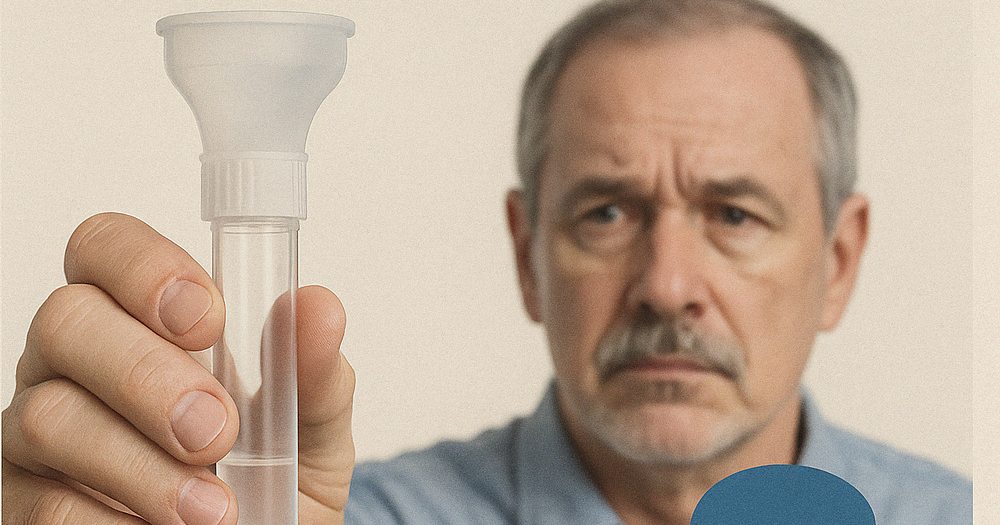A simple spit test could turn the tide on prostate cancer

Imagine catching a silent killer with nothing more than a spit in a tube. That's the promise of a new at-home test that's shaking up how we think about prostate cancer screening. Instead of relying on the decades-old PSA blood test — which has a bad habit of crying wolf — scientists have cooked up a spit-based DNA test that actually knows what it's looking for.
"It could be possible to turn the tide on prostate cancer," says Professor Ros Eeles, the oncogenetics lead at London's Institute of Cancer Research. And for thousands of men across the UK, that tide can't turn soon enough.
How does it work?
At its core, this isn't just a spit test — it's a genetic crystal ball.
- The test pulls DNA from a man's saliva and analyzes 130 genetic variants known to raise prostate cancer risk.
- This creates a polygenic risk score (PRS), a kind of genetic fingerprint showing how likely someone is to develop the disease.
Men who fall into the highest 10% of risk are flagged for further screening — think MRIs and biopsies. And the results? Well, they're hard to ignore.
In a group of 468 high-risk men, 40% were diagnosed with prostate cancer. That's far better odds than the PSA test, which only correctly flags about 25% of the time. Even more jaw-dropping: 63% of these men had "normal" PSA levels, which would have left their cancer entirely undetected. One test caught what another missed.
And it goes even further. Turns out this test is better than even an MRI for these high-risk folks — detecting cancers that scans missed in over 66% of cases.
Why does it matter?
Because the current system is broken.
- The PSA test gets it wrong three out of four times.
- It sends men into an anxiety spiral over slow-growing cancers that may never cause harm.
- It misses the dangerous, fast-moving cancers that actually need treatment.
That means too many men go through stressful scans, painful biopsies, or needless treatments — all for nothing. Worse, the men who do need care often get missed entirely.
Professor Kristian Helin, CEO at ICR, sums it up neatly: "The current PSA test often leads to unnecessary treatments and, more concerningly, fails to detect some cancers." With cases of prostate cancer expected to double by 2040, the time for change is now.
The context
This isn't just a flash in the pan. It's the product of years, even decades, of research.
The BARCODE 1 study, backed by big names like Cancer Research UK and the European Research Council, enrolled over 6,000 men aged 55-69. That's the danger zone for prostate cancer. The new test they trialed is now evolving into something even more powerful — PRODICT — which can assess men from more diverse backgrounds, including Black and Asian populations who are often left out of these conversations.
And the stakes are high. Prostate cancer kills 12,000 men a year in the UK alone. "Right now, there's no reliable method to detect aggressive prostate cancer," says Naser Turabi from Cancer Research UK. "This study brings us a step closer."
Even more compelling? A massive £42 million TRANSFORM trial is now underway to pit this DNA test head-to-head with PSA and MRI screening. Early forecasts suggest it could detect 12,350 cases sooner — and save the NHS a whopping £500 million a year.
For Dheeresh Turnbull, a 71-year-old retiree from Brighton, the study was a literal lifesaver. "I have no family history... I was completely shocked," he said. "But because of this study, two lives have now been saved in my family."
A simple spit may sound like a small thing. But for thousands of men and their families - it could mean everything.
💡Did you know?
You can take your DHArab experience to the next level with our Premium Membership.👉 Click here to learn more
🛠️Featured tool
 Easy-Peasy
Easy-Peasy
An all-in-one AI tool offering the ability to build no-code AI Bots, create articles & social media posts, convert text into natural speech in 40+ languages, create and edit images, generate videos, and more.
👉 Click here to learn more


